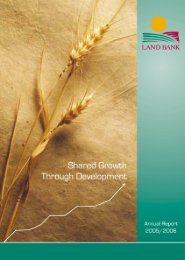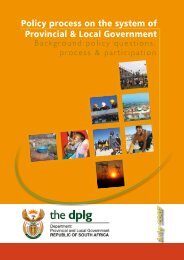Human Settlements Review - Parliamentary Monitoring Group
Human Settlements Review - Parliamentary Monitoring Group
Human Settlements Review - Parliamentary Monitoring Group
Create successful ePaper yourself
Turn your PDF publications into a flip-book with our unique Google optimized e-Paper software.
<strong>Human</strong> <strong>Settlements</strong> <strong>Review</strong>, Volume 1, Number 1, 2010<br />
materials, such as clay, wood, or thatching.<br />
In most cases the utilization requires skilled<br />
personnel, and requires money to purchase<br />
materials and to pay artisans for work done.<br />
This contrasts with what was achieved over<br />
centuries by many indigenous societies, who<br />
relied on locally available materials and their<br />
own skills. This vernacular knowledge is<br />
nowadays often ridiculed and described as<br />
back ward, although they could be described<br />
as eco-materials.<br />
Non-conventional or alternative technologies<br />
have been advocated especially in the 1960a<br />
and 1970s. Wang (1991:10) differentiates<br />
between three terms, which are often lumped<br />
together. The first is intermediate technology,<br />
an approach to development in which full<br />
industrial technology is eventually possible.<br />
The second term, appropriate technology<br />
was discussed above. Proponents criticised<br />
many industrial technologies, which are<br />
not appropriate for poor communities. The<br />
third term alternative technology, is a radical<br />
criticism of the excesses of the industrial<br />
society. By promoting alternative technology,<br />
its proponents seek to reform society by making<br />
use of technology, which is environmentally<br />
sustainable, affordable, and allows equity in<br />
the access to resources. The alternative to<br />
industrial technology should have aspects<br />
accommodating the needs of the rich and<br />
also the poor. The rich need a technology<br />
to allow them to achieve their desired living<br />
conditions without unnecessary depletion of<br />
natural resources, whereas the poor require<br />
technology suitable for their survival needs<br />
(Wang 1991:11). These technologies should<br />
be cheap, simple and effective. Among the<br />
alternative technologies are for example biogas<br />
plants, which make use of waste products,<br />
are environment friendly, and could be used<br />
for fertiliser production and to produce gas<br />
for cooking purposes in rural areas, thereby<br />
minimising the need for firewood.<br />
Intermediate technology is concerned with<br />
small-scale industries starting with existing<br />
techniques and using knowledge of advanced<br />
techniques to transform or improve them<br />
(Rondinelli & Ruddle 1978:105-106). In poor<br />
communities technological innovations must<br />
be inexpensive and of minimal risk. Thus to<br />
be relevant, the demand for products must be<br />
within the purchasing power of the consumers.<br />
Another form of intermediate technology is<br />
village technology aimed at small farmers. It<br />
is advocated that innovations in this respect<br />
should begin at the current level of village<br />
competence, for example using traditional<br />
carpenters or blacksmiths. Materials used<br />
should be locally available at low costs.<br />
“Village technology should seek principally<br />
to reduce bottlenecks and constraints in<br />
production systems” (Rondinelli & Ruddle<br />
1978:104). Intermediate technology must<br />
be made available to those interested and<br />
requiring it. Knowledge can be transmitted<br />
through training and information channels<br />
from one place to another. A central authority<br />
gathering, researching and providing relevant<br />
information, can be a useful point to start with<br />
the dissemination process.<br />
The term ‘appropriate technology’ is defined<br />
by Napier, et al. (1987:1) as “technology that<br />
is appropriate to the needs of a particular<br />
society at its present level of development,<br />
since different cultural and geographic groups<br />
require different technologies.<br />
13





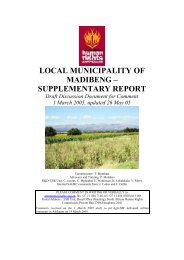
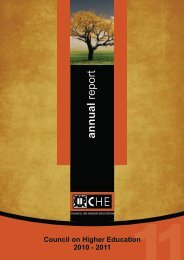
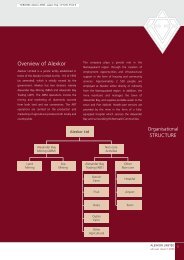

![National Research Foundation Annual Report 2008 / 2009 [Part 2]](https://img.yumpu.com/49774036/1/177x260/national-research-foundation-annual-report-2008-2009-part-2.jpg?quality=85)

